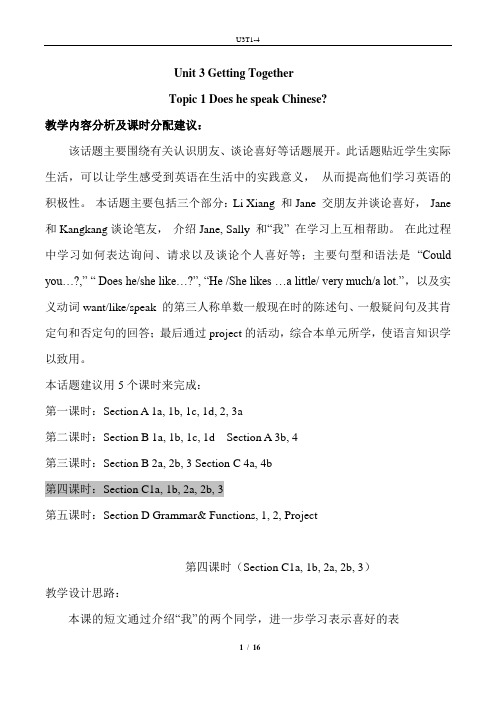UNIT 3 Getting Together TOPIC 1 Does he speak Chinese Section A 课件1 --优质公开课-科普社7上精品
仁爱版七年级英语上册Unit3Topic1DoeshespeakChineseB优质教案(2)

《Unit3GettingTogetherTopic1DoeshespeakChinese?SectionB》Ⅰ.Teachingaimsanddemands教学目标1.Learnsomenewwords:live,say,visit,great,wall2.Learnsomequestionsandanswerswith does:(1)—DoeshespeakChinese?—Yes,hedoes./No,hedoesn’t.HespeaksEnglish.(2)—Whatdoeshesayintheletter?—HewantstovisittheGreatWall.3.Learnsomeusefulsentences:(1)—Whoistheletterfrom?—It’sfrommypenpal,Sam.(2)—IstheletterinEnglish?—Yes,itis.(3)—Wheredoeshelive?—HelivesinEngland.(4)Kangkangknowsme.Ⅱ.Teachingaids教具图片/教学挂图/录音机/幻灯片/若干个装有信件的信封/小黑板Ⅲ.Five-fingerTeachingPlan五指教学方案Step1Review第一步复习(时间:10分钟)以问题为线索,引出单词和话题,培养学生的语言表达能力。
1.(检查作业。
教师请学生登台表演上节课的家庭作业。
)T:Now,I’llcheckyourhomework.S1、S2,please,cometothefrontandperformyourdialog.2.(师生对话。
引入并运用China和Chinese。
)T:IcomefromChina.IamChinese.Ss:WecomefromChina.We’reChinese.(教师提问一名学生。
)T: Wheredoyoucomefrom,S3?S3:IcomefromChina.T: DoyouspeakChinese?S3:Yes,Ido.(学生两人一组互相问答。
七年级英语上册 Unit 3 Getting together Topic 1 Does he sp

Topic 1 Does he speak ChineseSection BI. Material analysis本节课是本话题的第二课时,主要活动是1a。
通过Jane和Kangkang谈论笔友的对话场景,学习实义动词live/say/visit在第三人称单数一般现在时中的陈述句、一般疑问句及肯定和否定回答等,同时也进一步巩固人称代词的主格和宾格的用法。
II. Teaching aims1. Knowledge aims能根据已学语音、音标及发音规则,正确朗读和拼写下列词汇并运用于情景对话中:lot, a lot, about, live, say,visit;能在Section A的语法基础上,正确运用speak, live, say, want等实义动词第三人称单数的一般现在时的陈述句、一般疑问句及其肯定和否定回答,同时巩固人称代词的主格和宾格的用法;能在情景对话与人物汇报中,运用“表达询问、谈论喜好、结交笔友”等交际功能的基本表达形式,如:(1)—Does he speak Chinese? —No, he doesn’t.(2)—Does he live in England? —Yes, he does.(3)—Does Lucy like China? —Yes, she does.2. Skill aims能听懂有关表达询问、请求、谈论喜好的简单对话或叙述;能根据图片就表达询问、请求、谈论喜好等的话题进行交流、陈述或问答训练;能正确地朗读对话,并根据图文理解相关话题,抓住大意,并根据要求进行学习活动;能写出表达询问、请求和谈论喜好的简单句子,能用第三人称单数写出一篇介绍人物的短文。
3. Emotional aims在对话、汇报、问答等课堂活动中,提高学习英语的兴趣,并敢于开口说英语,积极参与课堂活动。
III. The key points and difficult points在对话操练、短文汇报呈现、两两问答等活动中,能够熟练运用实义动词live/visit的第三人称单数的一般现在时陈述句、一般疑问句及其肯定、否定回答以及人称单词的主格和宾格的用法。
仁爱版英语七年级上册Unit3GettingTogether1.DoeshespeakChinese

一、改写句子1. It is a clock.(改为一般疑问句)________ ________ a clock?2. Anna likes ice cream after dinner. (改为一般疑问句)________ Anna ________ ice cream after dinner?3. Tom has an English party on May5th.(改为一般疑问句)__________ Tom__________ an English party on May 5th?4. He has long arms and legs. (改为一般疑问句)________ he ________ long arms and legs?5. She has to clean her room every day. (改为一般疑问句)_______ she _______ to clean her room every day?二、单项选择6. I usually go to school ________ bu s, but today I get there ________ my father’s car. A.by; in B.by; on C.in; by D.on; by7. There ________ a pencil and some pens in the pencil box.A.be B.are C.is D.has8. —Who is Polina Semionova?—Oh, she is a ballet dancer. She dances really .A.good; good B.good; well C.well; good D.well; well9. Have you read the book Harry Potter ________ J. K. Rowling?A.by B.to C.on D.in10. Ann has a cute cat. ________ color is brown. ________ my favorite pet. A.Its, It’s B.It’s, Its C.It’s, It’s D.Its, Its11. My pencils are in the pencil box, ________ my ruler is not in it.A.and B.so C.but D.for12. —What do you want me to get, dear?—Let me see. We have _______ bread and milk left, but there isn’t enough fruit. A.many B.much C.few D.little13. There is _________ meat in the fridge. We must buy some.A.a little B.little C.a few D.few14. There are 40 students in our class, but ________ 10 boys.A.all B.only C.always D.everywhere15. Alice likes rice dumplings ________ red beans in them.A.has B.has not C.with D.no with三、句型转换16. What is he like?(改为同义句)________ _________ he ________ ________?17. My sister has music on Tuesday afternoon.(改为否定句)________________________________________________18. Mum goes to the supermarket in Sunshine Shopping Centre once a week. (对划线部分提问)________ ________ does Mum go to the supermarket in Sunshine Shopping Centre? 19. Alan wants to play with his classmates after school.(改为否定句)Alan __________ __________ to play with his classmates after school.20. This is my chair.(改为同义句)_______ _______ is ________.四、单词拼写21. David’s father and Jim’s father are ________________(警察).22. I ________ (保证) I’ll call you back.23. He has got a lot of ________(明信片) in his schoolbag.24. Paul likes drawing (画画). These are his p____________.25. My aunt is my grandparents’ d________.五、用所给单词的正确形式填空26. Sometimes the boy ________ (be) late for school.27. My brothers ________ (ride) a bike to school.28. Mr. Wu ________ (teach) us English.29. My father has many unusual ________________ (experience).30. Those________ (farm ) grow rice every year.六、完成句子31. 你的笔友来自哪里?________ ________ your penfriend ________ ________?32. 我最喜欢万圣节。
科普版七年级英语上册《nit 3 Getting Together Topic 1 Does he speak Chinese. Section B》精品教案_12

Unit3 Topic 1 Does he speak Chinese?Section BI. 教材分析本节课是本话题的第二课时,主要活动是1a。
通过Jane和Kangkang谈论笔友的对话场景,学习实义动词live/say/visit在第三人称单数一般现在时中的陈述句、一般疑问句及肯定和否定回答等,同时也进一步巩固人称代词的主格和宾格的用法。
II. 教学目标1. 知识目标能根据已学语音、音标及发音规则,正确朗读和拼写下列词汇并运用于情景对话中:lot, a lot, about, live, say, visit;能在Section A的语法基础上,正确运用speak, live, say, want等实义动词第三人称单数的一般现在时的陈述句、一般疑问句及其肯定和否定回答,同时巩固人称代词的主格和宾格的用法;能在情景对话与人物汇报中,运用“表达询问、谈论喜好、结交笔友”等交际功能的基本表达形式,如:(1)—Does he speak Chinese? —No, he doesn’t.(2)—Does he live in England? —Yes, he does.(3)—Does Lucy like China? —Yes, she does.2. 技能目标能听懂有关表达询问、请求、谈论喜好的简单对话或叙述;能根据图片就表达询问、请求、谈论喜好等的话题进行交流、陈述或问答训练;能正确地朗读对话,并根据图文理解相关话题,抓住大意,并根据要求进行学习活动;能写出表达询问、请求和谈论喜好的简单句子,能用第三人称单数写出一篇介绍人物的短文。
3. 情感目标能在对话、汇报、问答等课堂活动中,提高学习英语的兴趣,并敢于开口说英语,积极参与课堂活动。
能理解Friends are sunshine in life.朋友是生活中的阳光。
III.教学重难点在对话操练、短文汇报呈现、两两问答等活动中,能够熟练运用实义动词live/visit 的第三人称单数的一般现在时陈述句、一般疑问句及其肯定、否定回答以及人称单词的主格和宾格的用法。
仁爱英语Unit 3 -4复习导学稿

Unit 3 Getting Together Topic 1 Does he speak Chinese1. Could you please tell me your name?2. Do you come from the USA?Yes, I do. No. I don'tDoes he come from the USA?Yes, he does. /No, he doesn't3. Could you help me with it?No problem.4. My English is poor.be poor in5. Who is the letter from6. What does he say in the letter?7. He wants to visit the Great wall.8. Where does he come from?He comes from…9. She comes from Canada.She speaks English.10. Many students like English a lot.I don’t like it at all.He doesn't like it at all.11. I help her study Chinese.We help each other.12. We like him.He like us.She looks after him.13. Do you like English?Yes. I like English a lot/little/very much.No, I don’t like it at all.14. I have a pet at home.15. I t’s name is…Topic 2 What does your mother do?I’m home1. Please have a seat.2. What does your mother do?What is your mother?She is a driver/farmer./cook…代词主格、宾格I me you you she her he him it it we us you you they them3. What do your parents do?They are both office workers.4. Where does he work?He works…Where do they work?They work in the factory.on the farmin an office.in the field.in the hospital5. This is a photo of my family.6. the young man in yellow.7. My grandparents live with us andlook after Rose at home.Topic 3 What would you like to drink?1. Help yourselves.2. I would like an egg and some fish.Would you like some fish?Yes please. No, thanksWould you like to…3. What would you like to drink?to eatI’d like a glass of milk.4. What about some…?Good idea.5. What do you usually have for break fast?I usually have. chicken with vegetables.6. May I take your order?7. Would you like some thing to drink?Wait a moment.Would you like to have dinner with me.Yes, I’d love to8. Why not have some eggs?9. Help yourself to some fish.10. They are kind to me.11. I like Chinese food, such as…12. I’m very glad to be here.13. Wait a mo ment please.可数名词不可数名词Unit 4 Topic 1 What can I do for you?1. What can I do for you=Can I help you2. I want to buy…for….3. Can I try it on.4. I t looks very nice on you.5. How much is it?We’l l take it.6. I’m just looking.7. How do you like…?What do you think of…8. Why not try on that pair?9. Are you kidding?10. I’l l think about it.11. Could you help me do some shopping.12. What do we need?13. How much salt do we need?How many bottles do we need?14. How much are they?Topic 21. This is kang kang.2. Are you free=Do you have time?3. Nould you like to…?I’d love to / I’m sorry I can't. I have to cook.4.Please tell Maria about it.5. I’l l call her.6. Don't forget to bring your guitar.Forget doing sth. 语法数词的表达7. What’s up.8. How about / What about…9. May I speak to…This is…10. Could you ask her to call me back.11. That would be very nice.12. Maria isn't in now.Topic 31. Do you have any free time tomorrow2. What’s up?3. We want to go to the zoo时间表达法4. Let’s meet it at 9 o'clock5. What time is it? What’s the time?6. Are we all here?7. What are your favourite animals.8. I t’s time to go home / have breakfast9. We have to go now.10. What’s wrong with…11. I can’t find my way home.12. Don’t worry. Let me help you.13. Here we are.14. I t’s very kind of you.15. Here we are16. Thank you for your help.。
【公开课教案】仁爱英语七上Unit 3 Topic 1 Section C

Unit 3 Getting TogetherTopic 1 Does he speak Chinese?教学内容分析及课时分配建议:该话题主要围绕有关认识朋友、谈论喜好等话题展开。
此话题贴近学生实际生活,可以让学生感受到英语在生活中的实践意义,从而提高他们学习英语的积极性。
本话题主要包括三个部分:Li Xiang 和Jane 交朋友并谈论喜好,Jane 和Kangkang谈论笔友,介绍Jane, Sally 和“我” 在学习上互相帮助。
在此过程中学习如何表达询问、请求以及谈论个人喜好等;主要句型和语法是“Could you…?,” “ Does he/she like…?”, “He /She likes …a little/ very much/a lot.”,以及实义动词want/like/speak 的第三人称单数一般现在时的陈述句、一般疑问句及其肯定句和否定句的回答;最后通过project的活动,综合本单元所学,使语言知识学以致用。
本话题建议用5个课时来完成:第一课时:Section A 1a, 1b, 1c, 1d, 2, 3a第二课时:Section B 1a, 1b, 1c, 1d Section A 3b, 4第三课时:Section B 2a, 2b, 3 Section C 4a, 4b第四课时:Section C1a, 1b, 2a, 2b, 3第五课时:Section D Grammar& Functions, 1, 2, Project第四课时(Section C1a, 1b, 2a, 2b, 3)教学设计思路:本课的短文通过介绍“我”的两个同学,进一步学习表示喜好的表达法。
首先通过头脑风暴的方式复习了第三人称单数的一般现在时,为本课学习做铺垫。
通过引入学生喜欢的明星导入本课的重难点,即like…a little, like…a lot/very much, doesn’t like at all.然后让学生结合实际生活,谈论对英语和语文学科的喜好,及时进行复习巩固,同时也训练学生将图表信息转化为口头表达的能力。
仁爱英语七年级上册知识点总结Unit3

Unit3 Getting TogetherTopic1 Does he speak ChineseU3 T1 Section A核心知识点:1.Excuse me, could you please tell me your name?请您把名字告诉我好吗?(1)“Could you please”是一种常用的委婉客气的表达请求句型,用来征求别人的意见,是一种较为礼貌的用语,后接动词原形。
意思是“请您……好吗?”,“请问,您可不可以……?”。
如:Could you please help me? Could you please tell me your telephone number?【拓展】(1)与“Could you please …?”类似的请求用语有“Would you please …?”,还有“May I…?”意为“我可以……吗?”。
如:Would you please give the book to Michael? 请你把这本书给迈克尔,行吗?May I have your name?我可以知道您的名字吗?(请问你叫什么名字?)(2) “Could you please do sth.?”的否定句式为:“Could you please not do sth.?”,意为“请你别做某事好吗?”。
如:Could you please not tell him my telephone number?请你别把我的电话号码告诉他好吗?(2)tell sb. sth.告诉某人某事2.Sure.My name is Jane.当然可以。
我的名字叫简。
这里的sure相当于yes,OK,all right,of course(当然)或certainly(当然可以),常用来应答别人,而且态度十分肯定。
如-Can you help me?你能帮助我吗?-Sure.当然可以。
3.He can speak some Chinese.他会讲一些汉语。
Unit3 Getting TogetherTopic1 Does he speak ChineseSectionB

lot live
﹤
visit say about
居住 参观 说、讲 关于 许多
Step2 Listen look and say
1.Listen to 1a and answer these questions
questions: a) The letter is from ________
A. Jane B. Kangkang
Sam England English Chinese China Beijing
Work in gronps ( Read 1a again and find out important phrases and sentenses )
Group1、2、3: 说英语 speak English
住在 live in
在肯定句中,当主语是第 三人称单数时,后跟动词的单 三形式(即在动词后加s)
练一练:
1. She __h_a_s__(have) a round face. 2. Maria _c_o_m_e_s_ (come) from Cuba. 3. Kangkang k_n_o_w__s_(know) a lot about Michael. 4. Jane __sp_e_a_k_s__(speak) English. 5. Hanmei and her sister __li_v_e____(live) in Shanghai. 6. My English teacher often _h_e_lp_s___(help) me with
my English
当主语是第三人称单数时, 其一般疑问句在句首加Does, 动词用原形
Work in groups ( ask and answer one by one with the verbs in the box ) A: Do you have a knife? B: Yes, I do. / No , I don’t. Does
- 1、下载文档前请自行甄别文档内容的完整性,平台不提供额外的编辑、内容补充、找答案等附加服务。
- 2、"仅部分预览"的文档,不可在线预览部分如存在完整性等问题,可反馈申请退款(可完整预览的文档不适用该条件!)。
- 3、如文档侵犯您的权益,请联系客服反馈,我们会尽快为您处理(人工客服工作时间:9:00-18:30)。
mouth.
. But my Englis me with my English? I want
to be a pen pal with you. Yours,
1. — Could you please+动词原形 你能……吗?
— Sure./Of course./No problem./Sorry.
like v.喜欢 speak v. 说,讲(语言) often adv. 常常
• Do you like English? Yes, I do./No, I don’t. • Do you often speak English? Yes, I do./No, I don’t.
Pair work:
帮助某人学习某种语言
I help her with her Chinese.
— Could you please do sth.?
你能……吗?请你……好吗?
— Sure./No problem./ OK. / Sorry.
当然./没问题./好的. /对不起.
— Could you please tell me your name?
A: Excuse me, could you please tell me your name?
B: Sure. My name is
A: Do you come from
.
?
B: No, I don’t. I come from
.
Pair work:
A: Oh, I have a pen pal in He/ She can speak some like ? B : Yes, I do. But my Could you help me with it? A: No problem. . . Do you is poor.
pen _____ pal in America. Her I have a ____ helps me English is very good. She ______ with my English. She likes Chinese. But _____ some Chinese. So, she can only speak_______ I help her with her _________. Chinese
Sure. I’m …
some
你还好吗?
He can speak some Chinese.
problem
It’s a problem.
well
She can speak English very well.
often
He often helps his classmates.
help sb. with +语言
2. tell sb. sth.告诉某人某事
3. come from=be from
4. help sb. with sth./help sb.(to) do sth.
帮助某人做某事
5. speak +某种语言
6. No problem. = Sure.
Thank you!
UNIT 3 Getting Together
TOPIC 1 Does he speak Chinese
Section A
New words and expressions.
pen pal
They are pen pals.
tell, sure
Could you tell me your name?
— Sure. My name is Xiaoming.
— Could you please tell me your age?
— No problem. I'm 12 years old.
— Could you please tell me your telephone number? — OK. My telephone number is 5223434.
假设你想寻找一位笔友,请根据下列提示填 写出一封交友信。 Dear friend, My name is is from Grade . I’m . My English name years old. I come ,
. I am in Class .
I have
I like
face,
eyes and
